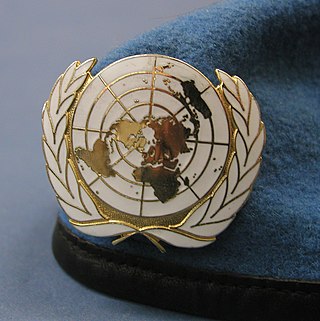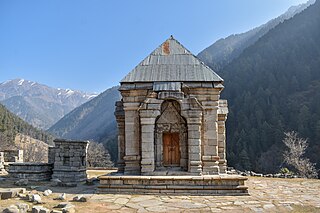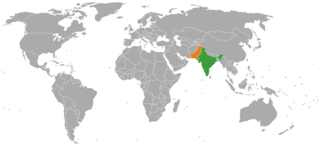
A ceasefire, also spelled cease-fire, is a stoppage of a war in which each side agrees with the other to suspend aggressive actions often due to mediation by a third party. Ceasefires may be between state actors or involve non-state actors.
The Karachi Agreement of 1949 was signed by the military representatives of India and Pakistan, supervised by the United Nations Commission for India and Pakistan, establishing a cease-fire line in Kashmir following the Indo-Pakistani War of 1947. It established a cease-fire line which has been monitored by United Nations observers from the United Nations since then.

The United Nations has played an advisory role in maintaining peace and order in the Kashmir region soon after the independence and partition of British India into the dominions of Pakistan and India in 1947, when a dispute erupted between the two new States on the question of accession over the princely state of Jammu and Kashmir. India took this matter to the UN Security Council, which passed resolution 39 (1948) and established the United Nations Commission for India and Pakistan (UNCIP) to investigate the issues and mediate between the two new countries. Following the cease-fire of hostilities, it also established the United Nations Military Observer Group in India and Pakistan (UNMOGIP) to monitor the cease-fire line.

United Nations Security Council Resolution 38, adopted on 17 January 1948, called upon the governments of the new dominions of India and Pakistan to refrain from in any way aggravating the situation in Kashmir and to deploy any means at their disposal to improve it. It further requested that both governments inform the Security Council of any material changes in the situation while it remained under the Council's consideration.

United Nations Security Council Resolution 47, adopted on 21 April 1948, concerns the resolution of the Kashmir conflict. After hearing arguments from both India and Pakistan, the Council increased the size of the UN Commission created by the former Resolution 39 to five members, instructed the Commission to go to the subcontinent and help the governments of India and Pakistan restore peace and order to the region and prepare for a plebiscite to decide the fate of Kashmir.

United Nations Security Council Resolution 80, adopted on March 14, 1950, having received the reports of the Commission for India and Pakistan, as well as a report from General A. G. L. McNaughton, the Council commended India and Pakistan for their compliance with the ceasefire and for the demilitarization of Jammu and Kashmir and agreement on Fleet Admiral Chester W. Nimitz as the future Plebiscite Administrator.

United Nations Security Council Resolution 91, adopted on March 30, 1951, noting a report by Sir Owen Dixon, the United Nations Representative for India and Pakistan, stating that the main point of difference of preparing the state of Jammu and Kashmir for the holding of a plebiscite were as follows; the procedure for and extent of demilitarization, the degree of control over the exercise of the functions of government necessary to ensure a free and fair plebiscite.

United Nations Security Council Resolution 96, adopted on November 10, 1951, having received a report by Mr. Frank Graham, the United Nations representative for India and Pakistan, as well as hearing his speech before the Council a basis for a program of demilitarization was noted with approval. The Council noted with gratification the declaration by both India and Pakistan that they would work for a peaceful settlement, continue to observe a cease-fire and accepted the principle that the accession of the State of Jammu and Kashmir should be determined by a free and impartial plebiscite under the auspices of the United Nations. The Council then instructed the UN Representative to continue in his efforts to obtain agreement of the parties on a plan for effecting the demilitarization of the State of Jammu and Kashmir and to report back on his efforts together with his view concerning the problems confided to him within six weeks.

United Nations Security Council Resolution 98, adopted on December 23, 1952, urged the Governments of India and Pakistan to enter into immediate negotiations under the auspices of the United Nations Representative for India and Pakistan in order to reach an agreement on the specific number of troops to remain of each side of the cease-fire line at the end of the previously established period of demilitarization. As proposed by the UN Representative this number was to be between 6000 Azad forces and 3500 Gilgit and northern scouts on the Pakistani side and 18000 Indian forces and 6000 local state forces on the Indian side. The resolution then thanked the UN Representative for his efforts, requested the Governments of India and Pakistan report to the Council no later than 30 days after the adoption of this resolution and asked the UN Representative to keep the Council informed of any progress.

United Nations Security Council Resolution 122 was adopted on 24 January 1957 and concerned the dispute between the governments of India and Pakistan over the territories of Jammu and Kashmir. It was the first of three security resolutions in 1957 to deal with the dispute between the countries. The resolution declares that the assembly proposed by the Jammu and Kashmir National Conference could not constitute a solution to the problem as defined in United Nations Security Council Resolution 91 which had been adopted almost six years earlier.

United Nations Security Council Resolution 123 was adopted on February 21, 1957, after the conflict over Jammu and Kashmir intensified. The council requested that the President of the Security Council visit the subcontinent and, along with the governments of India and Pakistan, examine any proposals which were likely to contribute to the resolution of the dispute. The council requested that he report back to them no later than April 15, and the resulting report formed the basis of United Nations Security Council Resolution 126, which was adopted in December of the same year.

United Nations Security Council Resolution 126 was adopted on 2 December 1957. It was the last of three resolutions passed during 1957 to deal with the dispute between the governments of India and Pakistan over the territories of Jammu and Kashmir. It followed a report on the situation by Gunnar Jarring, representative for Sweden which the council had requested in resolution 123. It requests that the governments of India and Pakistan refrain from aggravating the situation, and instructs the United Nations Representative for India and Pakistan to visit the subcontinent and report to the council with recommended action toward further progress.

United Nations Security Council Resolution 210, adopted unanimously on September 6, 1965, after receiving a report by the Secretary-General on the developments in the situation in Kashmir, the Council called on the parties to cease hostilities in the entire area of conflict immediately and withdraw all armed personnel to the positions they held before August 5, 1965. The Council requested the Secretary General do all he possibly could to give effect to the present resolution and resolution 209 as well as strengthening the United Nations Military Observer Group in Pakistan. The Council then decided to keep the issue under urgent and continuous review.

United Nations Security Council Resolution 211 was adopted on September 20, 1965. After the calls for a cease-fire in resolutions 209 and 210 went unheeded, the Council demanded that a cease-fire take effect at 0700 hours GMT on September 22 and that both forces withdraw to the positions held before August 5. The Council requested the Secretary-General ensure the supervision of the cease-fire and called on all states to refrain from any action which might aggravate the situation. The Council also decided that as soon as a cease-fire could be reached it would consider what steps could be taken to assist towards a settlement of the political problem underlying the conflict.

United Nations Security Council Resolution 214, adopted on September 27, 1965, after expressing concern that the cease-fire called for in resolutions 209, 210 and 211 was not holding, the Council demanded that the parties honor their commitment, cease-fire and withdraw all armed personnel.

United Nations Security Council Resolution 215, adopted on November 5, 1965, after the cease-fire called for in resolutions 209, 210, 211 and 214 and agreed to by India and Pakistan failed to materialize, the Council demanded that representatives of India and Pakistan meet with a representative of the Secretary-General to purpose schedules for the withdrawals. The Council urged this meeting to take place as soon as possible and requested the Secretary-General to submit a report on compliance with this resolution.

United Nations Security Council Resolution 303, adopted on December 6, 1971, after a lack of unanimity at the 1606th and 1607th meetings of the Council prevented it from exercising its primary responsibility, the Council decided to refer the question to the General Assembly.

United Nations Security Council Resolution 307, adopted on December 21, 1971, after hearing statements from India and Pakistan, the Council demanded that a durable cease-fire be observed until withdrawals could take place to respect the cease-fire line in Jammu and Kashmir. The council also called for international assistance in the relief of suffering and rehabilitation of refugees as well as their return home and a request for the Secretary-General to keep the council informed on developments.

United Nations Security Council resolution 1172, adopted unanimously on 6 June 1998, after hearing of nuclear tests conducted by India and Pakistan in May 1998, the Council condemned the tests and demanded that both countries refrain from engaging in further tests.

The Jammu and Kashmir Constituent Assembly was a body of representatives elected in 1951 to formulate the constitution of Jammu and Kashmir. The Constituent Assembly was dissolved on 26 January 1957, based on Mir Qasim resolution it adopted and ratified the constitution of jammu and kashmir on 17 November 1956.











